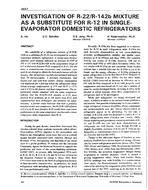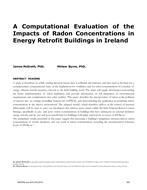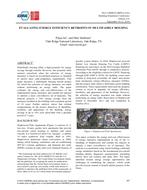The scroll compressor is being used in many US-manufactured heat pump systems. Because of their higher tolerance to liquid, many of the heat pump systems using scroll compressors do not use a suction line accumulator. The impact of removing the accumulator on the system performance of a residential heat pump was investigated. Tests were conducted on a heat pump with a nominal 10.6-kW (3-ton) capacity. The unit used an orifice expansion device in the heating mode and a thermostatic expansion valve (TXV) in the cooling (defrost) mode. Tests were run in psychrometric rooms at 1.7degC (35degF) dry-bulb temperature and 80% relative humidity. Removal of the accumulator produced a 10% reduction in defrost cycle time for the heat pump. However, there was nearly a 2% reduction in the integrated cyclic coefficient of performance (COP) for the system without a suction line accumulator. A detailed comparison of the refrigeration system dynamics during heating and defrost cycles were discussed. Pertinent performance data (pressure, temperature, power, capacity, etc.) was plotted and discussed to determine the effect of the accumulator.
KEYWORDS: year 1996, accumulators, performance, deicing, frost, air heat pumps, scroll compressors, testing, psychrometry, temperature, relative humidity, coefficient of performance, comparing, refrigeration
Citation: ASHRAE Trans. 1996, vol.102, part 1, paper number 3960, 284-290, 11 figs., 2 tabs., refs.
Product Details
- Published:
- 1996
- File Size:
- 1 file , 880 KB
- Product Code(s):
- D-16536


